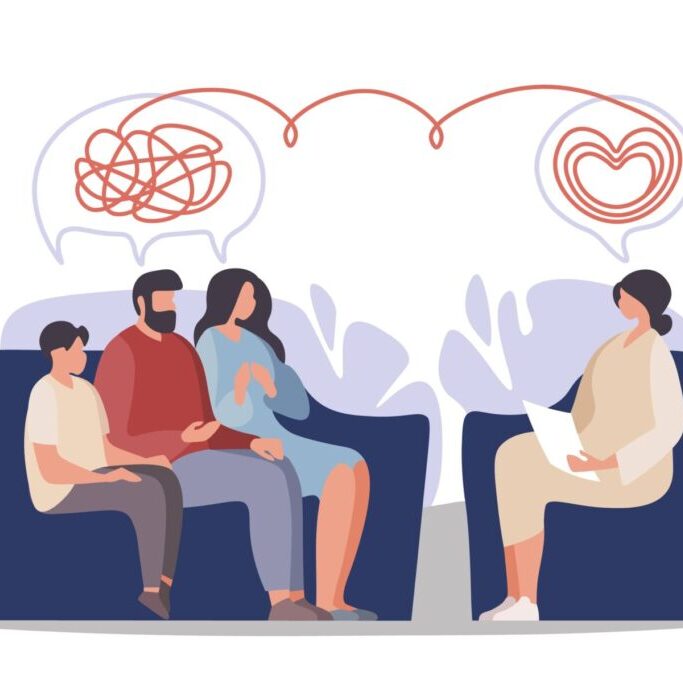Individual Therapy for Relationship Issues

You’re facing relationship issues – can individual therapy help? This question comes up a lot! Common impetuses to ask the question are consistent challenges in your relationships, dating problems, feeling broken in relationships, relationships in which one partner is more interested in therapy, and relationships in which one partner perceives the relationship problems to be bigger than other partners.
So, what is individual therapy for relationship issues?
Individual relationship therapy, also known as individual relationship counseling, is a therapeutic process tailored for individuals seeking to improve the quality of their personal relationships. Unlike couples therapy, where both partners participate, individual therapy focuses solely on one person’s experiences, thoughts, and emotions related to their relationships.
This form of therapy explores various aspects of an individual’s interpersonal interactions, aiming to identify and resolve issues that may contribute to relationship difficulties.
Do I Need Individual Relationship Counseling?
Determining whether you need individual therapy for relationship issues often starts with self-reflection. If you find yourself consistently facing challenges in your relationships, feeling unsatisfied, or noticing patterns of behavior that negatively impact your interpersonal connections, individual relationship counseling might be beneficial.
Common signs include persistent conflict, difficulty forming or maintaining relationships, feelings of loneliness or isolation, and repeated patterns of dysfunctional relationships.
Considerations for Choosing Individual Therapy vs. Couples Therapy
Choosing between individual therapy for relationship issues and couples therapy depends on specific circumstances and goals. If the primary concerns and issues reside with your own thoughts, behaviors, or emotional responses, individual therapy provides a private space to work through these personal challenges without the presence of a partner. It allows for deep personal growth and understanding, which can be crucial before or even during couples therapy.
What Will We Work On?
In individual therapy for relationship issues, a significant focus is placed on understanding and interpreting one’s family and relationship history. Often, the patterns of attachment that are established in early childhood and adolescence set a precedent for adult relationships.
For example, a person who observed or experienced dysfunctional family dynamics may unconsciously replicate similar patterns in their own adult relationships, such as conflict avoidance or dependency. By exploring these early influences, therapy helps uncover the roots of current relationship challenges, providing a clearer path for change and growth.
Personal traits that negatively impact relationships are also a major focus in therapy. Traits such as aggressiveness, passivity, or a generally pessimistic outlook can undermine relationships, creating barriers to intimacy and mutual understanding. Individual therapy works on recognizing these traits and exploring their impacts, while simultaneously developing new, more constructive behaviors and responses. This process not only aids in relationship improvement but also enhances overall personal well-being.
Emphasizing personal strengths forms another crucial aspect of individual therapy. Attributes like resilience, empathy, and patience can significantly enhance relationship satisfaction. By identifying and bolstering these strengths, individual therapy helps individuals utilize their best qualities to foster deeper connections with others and resolve conflicts more effectively.
Specific behaviors that contribute to relationship strife are addressed comprehensively in individual therapy as well. Whether it’s neglecting one’s partner’s emotional needs or engaging in harsh criticism, these behaviors can be deeply ingrained. Individual therapy provides strategies and tools to modify such behaviors, aiming to replace them with actions that promote harmony and respect within the relationship.
Managing difficult thoughts and emotions is another focal point. Feelings of inadequacy, insecurity, or unresolved anger and sadness can spill over into one’s relationships, often in destructive ways. Therapy offers techniques for better emotional regulation and strategies to cope with negative thoughts, leading to healthier interactions with others.
For those with children, becoming a better parent may be an essential goal; individual therapy can enhance parenting skills by fostering more effective communication, improved recognition of relationship patterns that play out in one’s parenting, and stronger emotional connections with children.
The establishment of healthy boundaries is integral to maintaining one’s mental health and ensuring relationship quality. Individual therapy assists in defining and communicating these boundaries clearly, which is particularly important in relationships that may be unequal or where there is a history of manipulation or abuse.
Furthermore, individual therapy can involve the acceptance of relationships that are beyond repair. Recognizing that not all relationships can or should be saved is a vital step in personal growth and emotional health. This acceptance enables individuals to move forward, making peace with the past and focusing on building healthier future relationships.
By addressing these various aspects, individual therapy for relationship issues aims to equip individuals with the understanding and tools needed for healthier, more satisfying relationships. This holistic approach not only improves specific interpersonal dynamics but also contributes to personal growth and emotional resilience.
Can Partners Join Individual Therapy Sessions?
While primarily focused on the individual, partners can sometimes participate in sessions to enhance understanding and cooperation. However, this is typically at the therapist’s discretion and based on specific therapeutic goals.
Does Individual Relationship Counseling Impact the Relationship Too?
Individual relationship counseling, while focused on the individual, can have profound effects on their relationships as well. By addressing personal issues, improving communication skills, and fostering greater self-awareness, the benefits gained by one partner often spill over into their interpersonal dynamics, influencing the relationship as a whole in several positive ways.
The Ripple Effect of Self-Improvement on Relationships
When an individual engages in therapy to address personal issues related to their relationships, they embark on a journey of self-discovery and growth. As they begin to understand and modify their behaviors, beliefs, and emotional responses, these changes can have a significant impact on their relationships.
For instance, individual therapy can help an individual recognize and alter patterns of negative communication, such as criticism or defensiveness, replacing them with more constructive communication styles like active listening and empathy. When these changes occur, it naturally leads to improved interactions between partners, often reducing conflicts and enhancing mutual understanding and respect.
Enhancing Emotional Availability and Empathy
One of the key benefits of individual relationship counseling is increased emotional availability and empathy. Through counseling, individuals often learn how to better manage their emotions and understand the emotions of others. This emotional attunement allows them to respond to their partner’s needs and feelings more effectively.
For example, if one partner typically withdraws in times of stress, therapy can help them learn to express their needs and concerns openly, making it easier for their partner to provide support. This not only strengthens the emotional bond between partners but also promotes a deeper sense of intimacy and trust. This dynamic can lead to a virtuous cycle, where positive changes in one partner foster positive responses in the other, thereby improving the overall health of the relationship.
Long-Term Impact on Relationship Dynamics
Over time, the improvements made by one individual in therapy can lead to a more satisfying and stable relationship overall. Partners often find that as communication improves and emotional wounds heal, they experience fewer misunderstandings and feel more valued and understood.
Additionally, as individuals in therapy work on their personal issues and development, they may become more proactive in addressing and resolving relational issues, leading to a more dynamic and resilient relationship.
While individual relationship counseling focuses on the individual, the changes and growth experienced by the participant can significantly influence their relationship dynamics. By improving one’s own emotional health, communication skills, and understanding of relationship dynamics, individual therapy can inadvertently strengthen and enrich both the individual’s and their partner’s relational experiences.
The Outcomes Can Be Profound!
Individual therapy for relationship issues offers a profound avenue for personal growth and relational improvement – it’s life-changing for many! By focusing on individual experiences and contributions to relational dynamics, equips individuals with the tools necessary for healthier, more satisfying interpersonal interactions. Whether addressing communication issues, emotional barriers, or relationship patterns, individual relationship counseling can pave the way for more fulfilling connections.
This blog is made for informational and educational purposes only. It is not medical advice. The information in this blog is not intended to (1) replace a one-on-one relationship with a qualified licensed health care provider, (2) create or establish a provider-patient relationship, or (3) create a duty for us to follow up with you.



